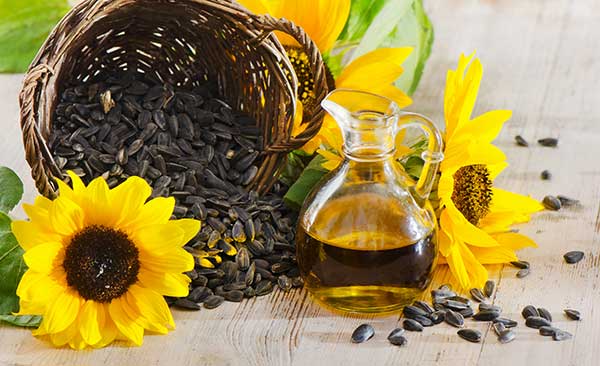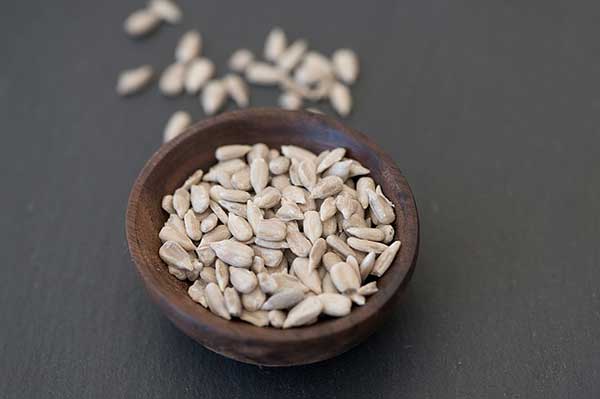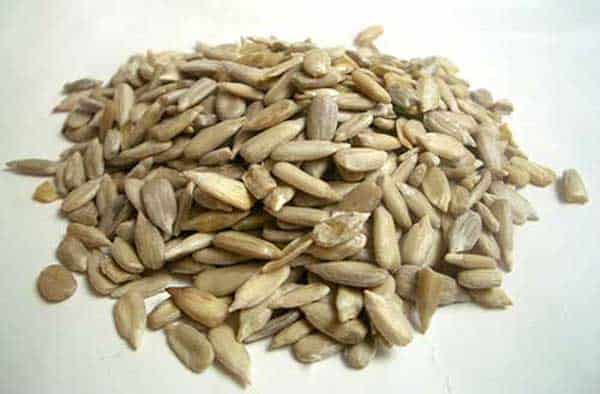Many cat owners ask this question a lot. Can cats eat sunflower seeds? Are sunflower seeds poisonous to cats?
Even before we can discuss sunflower seeds for cats, it is paramount we begin easy by understanding their benefits to us humans.
There has always been some debate as to whether seeds have any health benefits or side effects.
Up until recently, you would be forgiven for subscribing to the school of that believes any seed is healthy for our systems, simply because it is a natural and organic substance.
Indeed, research has now proven that certain seeds could also come with some inherent dangers, despite most earlier research studies expressly endorsing their consumption.
And now on to our next important question – are there any health benefits we can derive from them?
Table of Contents
The Health Benefits of Sunflower Seeds For Humans
First, sunflower seeds are known for their rich concentration of B complex vitamins. These vitamins promote a healthy body by regulating our nervous systems.
These seeds are also a good source of essential minerals such as iron, potassium, magnesium, phosphorus and calcium, as well as Vitamin E and protein. As if that’s not enough, sunflower seeds also contain zinc, copper, manganese, carotene and chromium.

Those looking for a rich source of good fat such as monounsaturated & polyunsaturated fatty-acids can also benefit greatly by incorporating sunflower seeds into their diets.
These fatty acids are especially recommended for people battling with arterial conditions such as arteriosclerosis.
Thanks to its wide spectrum of nutrients and mineral salts, you can benefit from the immune-boosting and stress-relieving effects of sunflower seeds.
The fact that these seeds are low in carbohydrates but high in protein makes them your ideal choice for tasty, fast snacks.
So now, we’ll discuss cats and sunflower seeds. Can cats have sunflower seeds safely? If so, are there any benefits?
Are Sunflower Seeds Poisonous To Cats?
After investigating the health benefits of sunflower seeds to humans, the next question to settle with is, “are sunflower seeds bad for cats?”
Well, we will say no, but advice you proceed with caution.
The following are some of the possible ways your feline friend might benefit from feeding it portions of sunflower seeds, and when it possible isn’t a good idea to feed the seeds to them.
The Health Benefits of Cats Eating Sunflower Seeds
1. Non-toxic:
According to the ASPCA, sunflower seeds have been marked as some of the safest seeds out there. Therefore, you can serve them to your pet cat without worrying about any serious reactions to its gastrointestinal health.
It is important though, to remember that due to the hardness of some sunflower seeds, they may become stuck in your cat’s gut. This is why experts recommend feeding the seeds to your cat in small, manageable portions.
2. Tasty:
Another benefit of introducing sunflower seeds to your cat is due to the pleasant taste that these seeds have. This taste is as a result of the high protein content in these seeds.
You can leverage this delicious taste if you wish to help your cat recover her lost appetite and improve her eating habits. This especially applies to young kittens, older kitties or sickly cats with poor appetite and hunger cravings.
It is also important to remember that the taste of food goes a long way in helping cats detect foods that they consider healthier for them.
So, you can also use sunflower seeds to introduce a particular food to your cat; one she may not agree with or one she is normally averse to.
3. B Vitamins Benefits for Your Cat:
Your cat will be able to take advantage of the many health benefits of B Vitamins.
The most common ones include boosting her metabolism through the conversion of nutrients into energy. This ensures your kitty remains active and playful, something that will go a long way in helping her keep feline lifestyle-related conditions at bay.
B Vitamins also contribute to the health and development of the cat’s brain as well as nervous system. This can translate into a lot of benefits, including proper coordination, attention and response to external stimuli.
Your cat will also benefit from B Vitamins in terms of her cardiovascular system. Certain B vitamins such as Vitamin B-6 are known to facilitate the formation of new red blood cells, thereby improving the cardiovascular and circulatory system of your cat.
Not only that, this B vitamin is also responsible for boosting your feline friend’s immunity. As a result, your cat will have a healthier coat, fur and paws, as well as lead a fulfilling social life.
4. Benefits Vitamin E Has For Your Cat:
Vitamin E is one of the most common ingredients in sunflower oil, and is great for revitalizing and invigorating your feline’s coat and hair.
Also, this vitamin is known to reverse coronary heart-disease. Thanks to the anti-inflammation properties of vitamin E that’s found in sunflower oil, your cat will find it very easy to recover from injury and inflammation.
Cats with poor eye sight can also take advantage of sunflower seed. But perhaps the greatest possible health benefits your cat can derive from sunflower seeds is the anti-carcinogenic properties of vitamin E present in these seeds.
Overall, the seeds go a long way in improving the immunity of your feline companion.
5. Benefits to Your Cat’s Digestion System:
You may have noticed a peculiar tendency in your cats to eat grass. And you may be wondering why that is so.
Well, cats occasionally nibble on green vegetation as it offers them the much needed fiber, as well as aid with digestion.
Vet Info believes that most cats will resort to eating vegetation if they do not get a sufficient supply of fiber in their diets. In such cases, sunflower seeds is an ideal recommendation.
6. Reduction of Occurrence of Infections:
Last but not least, sunflower seeds are remarkable for their ability to help your cats fight cases of arthritis.
Furthermore, these seeds will go a long way in keeping certain diseases at bay, especially diseases that the cat is highly susceptible to.
Therefore, in addition to her regular diet and exercise needs, you could also throw in sunflower seeds occasionally.

Can Cat Eat Shelled Sunflower Seeds?
This should be a no-brainer. If you discover that your cat ate sunflower seed shell, it is time to take immediate action.
? Sunflower shells are comparatively difficult to chew and digest. Therefore, they could get stuck on your cat’s throat and choke her.
Also, if your cat does not chew sunflower hulls properly, sharp pieces may pass into her stomach. In the process, these pieces could puncture your feline’s digestive system.
Even worse, they could attach themselves to the linings of her esophagus, thereby causing pain and other related discomfort.
The hardness of sunflower seeds could also slow down your feline’s digestion system. Remember, the goal is to have your cat’s metabolism improved so she can remain physically and socially active. Anything that goes against that should be shunned.
When Are Sunflower Seeds Unideal?
Though we have discussed some common benefits of sunflower seeds, you are bound to ask whether there are cases these seeds can be toxic to cats.
Usually, experts recommend sticking to the diet recommended by your vet. They also emphasize that even if your vet recommends a diet of raw food for your cat, that still does not give you the permission to feed sunflower seeds to it.
However, there are still a few things to keep in mind in case your cat is taken by sunflower seeds.
As we have already mentioned, ensure the seeds are unshelled. Shop-bought seeds are likely to be unshelled. However, raw, unprocessed sunflower seeds are normally shelled, and it is imperative you remove all the shell to make it easier for your cat to chew it.

Secondly, avoid feeding your cat commercial sunflower seeds which are specifically designed for human consumption. If consumed by cats, there could be problems ranging from choking to abdominal discomfort.
Vomiting and diarrhea are also associated with eating sunflower seeds, especially if your cat happens to have eaten the seeds in plenty. It is imperative that you seek urgent medical intervention immediately you notice something out of place.
Another thing you should watch out in industrially-prepared sunflower seeds is that most of them come with some seasoning.
Though you want your cat to identify with the delectable taste of sunflower seeds, the seasoning present in commercial seeds is not the right way to go. Salt, garlic, spices and other seasonings are all unsafe for cats. Therefore, avoid feeding unseasoned seeds to your cat.
Is Sunflower Seed Oil Safe For Cats?
Having investigated the possible benefits and effects of sunflower seed oil, you are possibly wondering, is sunflower seed oil safe for cats?
Well, the benefits of sunflower seeds and those of sunflower oil are more or less the same. But if you must feed your cat a sunflower diet, you would be better off opting for sunflower oil.
? The oil is way easier to digest as compared to seeds. Therefore, not only is their absorption into the cat’s system faster and more effective, the cat is also exposed to fewer risks of choking, injury to its gut or abdominal pains.
This also leads us to one more question…
Can Cats Eat Sunflower Seed Butter?
Again, you would prefer butter over the hard seeds as butter is easier to digest.
But as a general rule, ensure it is recommended for the consumption. Avoid industrially-prepared butter for it could contain dangerous flavorings and seasoning.
Conclusion
So, can cats eat sunflower seeds and not suffer any problems? The simple answer is yes.
Cats can consume sunflower seeds with no problems. If you must include it in her diet, do so in small, controlled amounts.
Small quantities of sunflower seeds are actually good for your cat. However, cat owners should only purchase natural seeds with no salt, spices or flavors added to them. Also, ensure the seeds are de-shelled for ease of chewing and digestion.
Sunflower seed oil and sunflower seed butter would be better alternatives. As a general rule, always have your vet’s phone number in speed dial, in case anything goes wrong.



